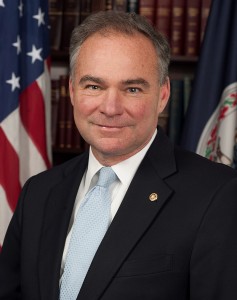 Democratic Vice-Presidential Candidate Tim Kaine gave the recent keynote address at the national dinner for the Human Rights Campaign, an LGBT advocacy group, and not only affirmed his own unwavering support for gay marriage but also predicted the Catholic Church, of which he is a member, would change its own position.
Democratic Vice-Presidential Candidate Tim Kaine gave the recent keynote address at the national dinner for the Human Rights Campaign, an LGBT advocacy group, and not only affirmed his own unwavering support for gay marriage but also predicted the Catholic Church, of which he is a member, would change its own position.
I think it’s going to change because my church also teaches me about a creator who, in the first chapter of Genesis, surveyed the entire world, including mankind, and said, ‘It is very good’.”
Kaine went on to quote Pope Francis “who am I to judge” and then added, “Who am I to challenge God for the beautiful diversity of the human family? I think we’re supposed to celebrate it, not challenge it.”
What is a Catholic supposed to do with these comments?
First, let’s take the “apophatic” approach. What shouldn’t a Catholic do? First of all, a Catholic shouldn’t question the sincerity of Mr. Kaine’s Catholicism. Kaine, whether you agree with him or not, is a committed Catholic. His experience in Honduras (1980-81) as a missionary with Jesuits appears to be quite formative. There, he learned firsthand the effects of extreme poverty and the violence associated with a dictatorship. He is fluent in Spanish as a result of his time in Honduras. And he is deeply committed to social justice, also as a result of his time there. He chose a career as a civil rights lawyer, fighting housing discrimination and he worships, regularly, at a predominately black Catholic Church in Richmond, VA. He goes to the Wednesday morning prayer group in the US Senate, and speaks often and passionately about his faith. Kaine loves Catholicism, he is committed to Catholicism, and seems as sincere as they come. Whether he is really Catholic enough should be an off-limits question.
Second, still in our “apophatic” vein, we shouldn’t take Kaine all that seriously in his speculation that the Church will change. Mr. Kaine is not a theologian, and definitely not a biblical scholar. Michael Sean Winters says it better than I could, but Kaine veered out of his lane on this one and spoke in an area he doesn’t have authority. He isn’t right, first of all, that the Church will change its position here, at least anytime soon, and even if the Church does change, it certainly wouldn’t be for the reasons Mr. Kaine cited. He’s a politician and we don’t need to fret too much about his theological speculation.
Finally, and no longer apophatically, we should recognize that Mr. Kaine, while erroneous in his reasoning, does speak for quite a large percentage of Catholics on this issue. Nearly 70% of U.S. Catholics support gay marriage. This is up dramatically from 35% in 2003. Only 45% of Catholics say that support for gay marriage goes against their religious belief.
For those who support the traditional stance on marriage, this is a problem. A big one. It means (a) that people aren’t getting an adequate dose of the Church’s teaching on marriage, (b) that even if they are hearing what the Church teaches, it isn’t convincing, or (c) some combination of the two.
My hunch is that people know the Catholic Church’s magisterial body opposes gay marriage but, and here’s the kicker, they just don’t know why. This teaching has traditionally been expressed in natural law language. Now, I love me some natural law. My first son is named after Thomas Aquinas and I begged, I mean begged to have my second son named Aristotle (much to my disappointment) but nothing makes somebody’s eyes glaze over like a good conversation on natural law. And it isn’t just that natural law arguments are difficult. It is that they aren’t persuasive. Evolutionary biology has thrown into doubt that there is an objective truth in the natural order, that there is a telos or purpose in the natural world. Postmodernism challenges the idea in a single and universal idea of the good and the true. Does this mean the natural law is irrelevant? I don’t think so (and I certainly hope not) but it does mean that both conceptually and rhetorically, natural law supporters have their work cut out for them to find arguments that work in a global, post-colonial, postmodern, empirically-minded world.
What about biblical arguments? Kaine goes to Genesis 1, that God made all things good, to make a biblical argument for why the Church should change its stance on gay marriage. Exegetically, he’s way off base. But Kaine’s comments show the difficulty in appealing to scripture for articulating a stance on a contemporary moral issue. The Bible does not speak with a single, monolithic voice on practically anything, nor does it provide sufficient grounds to address issues that were beyond the scriptural authors’ worldview. Gay marriage, as we know it, was beyond that worldview. The author(s) of Genesis certainly did not foresee a time when two men or two women would want to marry, buy a house, have kids, and raise those kids together. Neither could Paul, no matter what he wrote in Romans. And even if we do take Romans at face value, Paul said enough that we can disagree with (women covering their head and remaining silent, for example), that we might doubt the veracity of his stance on sex.
The fact is that on both rational (i.e. natural law) and divine (i.e. biblical) grounds, the Church’s teaching is just not convincing people. That doesn’t mean it is wrong but it does mean that it needs development. Tim Kaine’s position is no longer in the minority and so when he tries to reconcile his own stance with the Church’s conflicting stance, we don’t need to worry about whether he is Catholic enough, but rather worry about why the Church’s own claims about truth and goodness regarding sexuality no longer are reaching her members.


